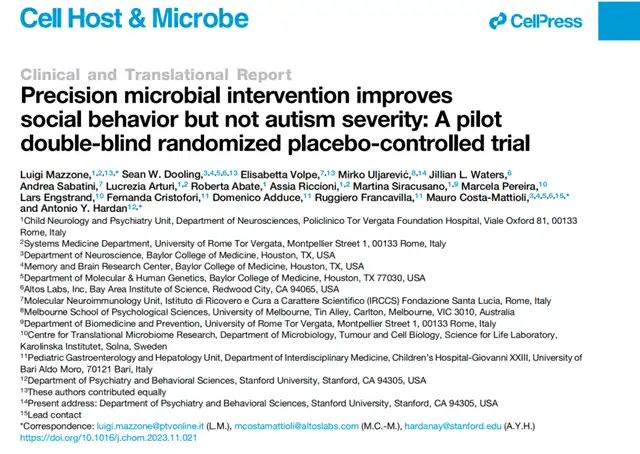Probiotic Treatment Improves Social Impairment in Autism
- Normal Liver Cells Found to Promote Cancer Metastasis to the Liver
- Nearly 80% Complete Remission: Breakthrough in ADC Anti-Tumor Treatment
- Vaccination Against Common Diseases May Prevent Dementia!
- New Alzheimer’s Disease (AD) Diagnosis and Staging Criteria
- Breakthrough in Alzheimer’s Disease: New Nasal Spray Halts Cognitive Decline by Targeting Toxic Protein
- Can the Tap Water at the Paris Olympics be Drunk Directly?
Probiotic Treatment Improves Social Impairment in Autism
- Should China be held legally responsible for the US’s $18 trillion COVID losses?
- CT Radiation Exposure Linked to Blood Cancer in Children and Adolescents
- FDA has mandated a top-level black box warning for all marketed CAR-T therapies
- Can people with high blood pressure eat peanuts?
- What is the difference between dopamine and dobutamine?
- How long can the patient live after heart stent surgery?
Probiotic Treatment Improves Social Impairment in Autism
Clinical trials have confirmed that oral administration of Limosilactobacillus reuteri (L. reuteri) may improve social impairment in children with autism spectrum disorder (ASD).
Recently, a collaborative effort between the Luigi Mazzone team at Tor Vergata University in Rome, the Mauro Costa-Mattioli team at Baylor College of Medicine in the United States, and the Antonio Y. Hardan team at Stanford University published a study.
After analyzing 43 children with ASD, the researchers found that those who received a combination treatment of L. reuteri (containing the strains ATCC-PTA-6475 and DSM-17938) showed significant improvement in social impairment compared to the placebo group. Importantly, L. reuteri was found to be safe and did not impact the children’s microbiome and immune system.
The research was published in Cell Host & Microbe.

ASD is one of the most common neurodevelopmental disorders in children, characterized by difficulties in social interaction and repetitive behaviors. Despite the increasing prevalence of ASD globally, currently approved medications like risperidone and aripiprazole have proven ineffective in addressing social impairments associated with ASD.
Previous studies indicated that L. reuteri could reverse social impairments in ASD mice, though it selectively improved social behavior without affecting other behavioral defects. To investigate whether this phenomenon would replicate in children with ASD, the researchers conducted a double-blind, randomized, placebo-controlled pilot clinical trial with 43 eligible participants.
After six months of treatment with L. reuteri combination therapy (ATCC-PTA-6475+DSM-17938), the participants showed significant improvement in social impairment, as evidenced by improvements in social reaction scores and social adaptive abilities compared to the placebo group (P values of 0.031 and 0.018, respectively).
In terms of safety, no serious adverse events were reported during the trial. Given the potential of L. reuteri to alter the gut microbiome, the researchers assessed its impact on the microbiome diversity, finding no significant changes.
Furthermore, L. reuteri treatment did not affect the immune cell counts of the children, aligning with observations in preclinical ASD mouse models where L. reuteri selectively improved social impairments without influencing the microbiome and immune system.
The researchers also conducted experiments to determine whether both strains in the L. reuteri combination were effective or if only one strain was sufficient. Using a specific ASD mouse model, they found that only L. reuteri ATCC PTA 6475 improved social impairments after four weeks of treatment.
In conclusion, this study suggests that social impairment in children with ASD can be improved with L. reuteri. The researchers emphasize the significance of these findings, especially considering the lack of FDA-approved treatments specifically targeting social impairments in ASD. However, they caution that further validation is necessary through larger clinical trials.
It’s important to note that this trial is still in the early stages, and parents of children with ASD are advised not to self-administer L. reuteri for treatment.
Probiotic Treatment Improves Social Impairment in Autism
Reference:
[1] Mazzone L, Dooling S W, Volpe E, et al. Precision microbial intervention improves social behavior but not autism severity: A pilot double-blind randomized placebo-controlled trial[J]. Cell Host & Microbe, 2023.
(source:internet, reference only)
Disclaimer of medicaltrend.org
Important Note: The information provided is for informational purposes only and should not be considered as medical advice.



